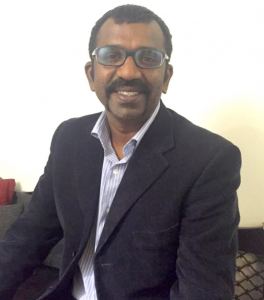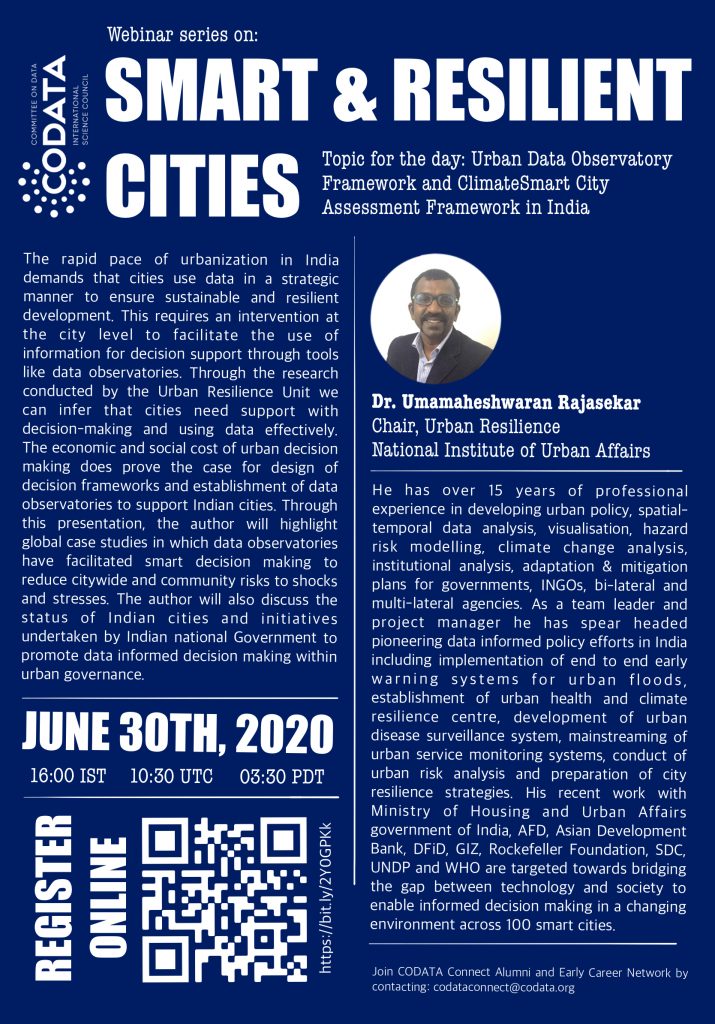Date: 30th June 2020
Time: 4:00 pm (IST)
Duration: 45 min session and 15 min Question Answers (Total 1 hour)
Registration Link: https://attendee.gotowebinar.com/register/7425978795990828557
The rapid pace of urbanization in India demands that cities use data in a strategic manner to ensure sustainable and resilient development. This requires an intervention at the city level to facilitate the use of information for decision support through tools like data observatories. Through the research conducted by the Urban Resilience Unit, we can infer that cities need support with decision-making and using data effectively. The economic and social cost of urban decision making does prove the case for design of decision frameworks and establishment of data observatories to support Indian cities. Through this presentation, the author will highlight global case studies in which data observatories have facilitated smart decision making to reduce citywide and community risks to shocks and stresses. The author will also discuss the status of Indian cities and initiatives undertaken by the Indian national Government to promote data-informed decision making within urban governance.
Name of the Speaker: Dr. Umamaheshwaran Rajasekar
Designation: Chair, Urban Resilience
Affiliation: National Institute of Urban Affairs
 Dr. Rajasekar has over 15 years of professional experience in developing urban policy, spatial-temporal data analysis, visualisation, hazard risk modelling, climate change analysis, institutional analysis, adaptation & mitigation plans for governments, INGOs, bi-lateral and multilateral agencies. As a team leader and project manager he has spearheaded pioneering data informed policy efforts in India including implementation of end to end early warning systems for urban floods, establishment of urban health and climate resilience centre, development of urban disease surveillance system, mainstreaming of urban service monitoring systems, conduct of urban risk analysis and preparation of city resilience strategies. His recent work with Ministry of Housing and Urban Affairs government of India, AFD, Asian Development Bank, DFiD, GIZ, Rockefeller Foundation, SDC, UNDP and WHO are targeted towards bridging the gap between technology and society to enable informed decision making in a changing environment across 100 smart cities.
Dr. Rajasekar has over 15 years of professional experience in developing urban policy, spatial-temporal data analysis, visualisation, hazard risk modelling, climate change analysis, institutional analysis, adaptation & mitigation plans for governments, INGOs, bi-lateral and multilateral agencies. As a team leader and project manager he has spearheaded pioneering data informed policy efforts in India including implementation of end to end early warning systems for urban floods, establishment of urban health and climate resilience centre, development of urban disease surveillance system, mainstreaming of urban service monitoring systems, conduct of urban risk analysis and preparation of city resilience strategies. His recent work with Ministry of Housing and Urban Affairs government of India, AFD, Asian Development Bank, DFiD, GIZ, Rockefeller Foundation, SDC, UNDP and WHO are targeted towards bridging the gap between technology and society to enable informed decision making in a changing environment across 100 smart cities.
His work has been published as peer reviewed journal articles, technical reports and has been presented at international forums and has been commended in the form of grants and awards by United States National Science Foundation, Rockefeller foundation, International Institute for Environment and Development, Gujarat Institute of Civil Engineers and Architects, Vastu Shilpa foundation and Dutch Ministry of Education. His recent work on development and implementation of Urban Services Monitoring System which connects more than 500 hospitals in the city of Surat, India to monitor critical water borne and vector borne diseases. His work in this area was recognized as an intervention to watch, by the U.N Secretary General’s global pulse initiative.

